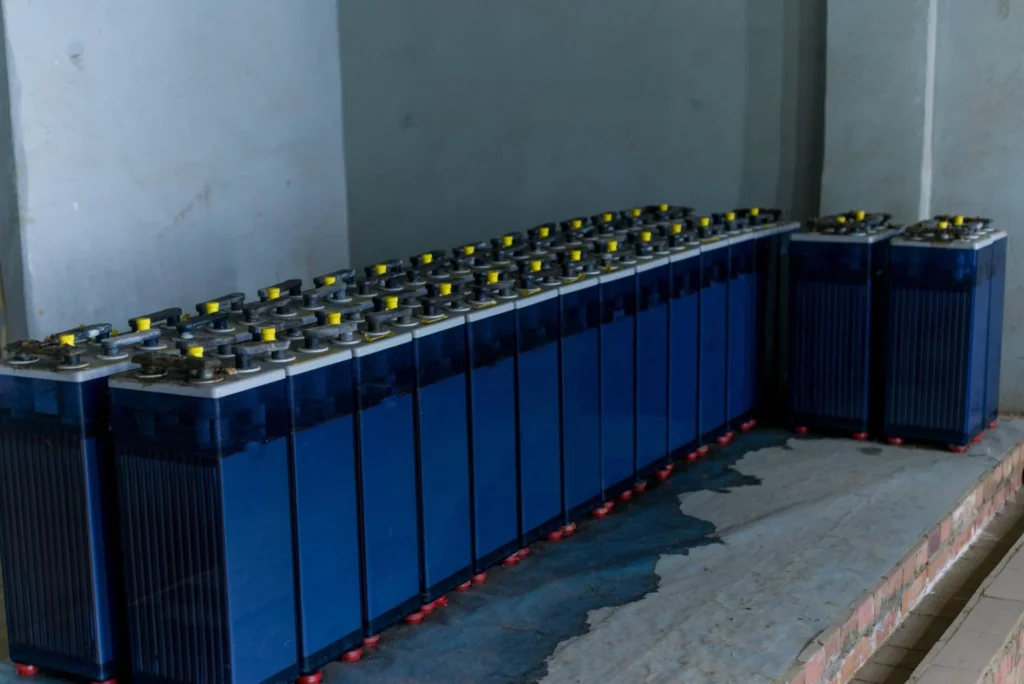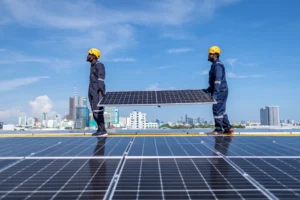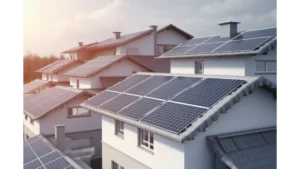
Off-grid solar panel systems have become increasingly popular as many people seek to reduce their reliance on traditional power sources and gain greater independence. However, maintaining the batteries that store energy collected from the sun is essential to ensure a reliable and consistent power supply. Whether you are a seasoned off-grid homeowner or just starting, it is important to understand the basics of solar panel batteries and how to properly care for them.
This article will overview best practices for maintaining your off-grid solar panel system’s batteries. From charging and monitoring battery levels to keeping them clean and checking water levels, we will cover everything you need to know about caring for your batteries and optimizing their performance. By implementing these tips, you can extend the life of your batteries while ensuring that your home remains powered even when the grid goes down.
A comprehensive understanding of solar panel battery operation principles is essential for ensuring sustained, efficient performance. Solar panel batteries are responsible for storing the energy produced by solar panels and making them available without sunlight. These batteries are typically lead-acid or lithium-ion and have different maintenance requirements. For instance, lead-acid batteries must be regularly checked for fluid levels and topped up with distilled water when necessary, while lithium-ion batteries require protection from overcharging.
To maintain solar panel batteries effectively, it is crucial to understand battery cycling. Battery cycling refers to the process of discharging and recharging a battery. Avoiding deep discharges as much as possible is essential because these can significantly reduce battery life. A shallow discharge followed by a full recharge is better than a deep discharge followed by a partial recharge.
Another important factor in maintaining solar panel batteries is temperature control. High temperatures can shorten battery life dramatically, while low temperatures can reduce charging efficiency. Therefore, it’s critical to keep the batteries at an optimal temperature range of between 20°C and 25°C (68°F -77°F). This can be achieved through proper ventilation and insulation.
In summary, maintaining off-grid solar system batteries requires regular check-ups on fluid levels (for lead-acid) or monitoring overcharge protection (for lithium-ion), avoiding deep discharges during battery cycling, and controlling the temperature within an optimal range of 20°C-25°C (68°F-77°F). By following these basic operation and maintenance principles, users can ensure that their off-grid systems remain efficient in providing them with power even on cloudy days or during emergencies without relying on traditional grid energy sources.
Properly charging your solar panel batteries ensures their longevity and optimal performance. Overcharging or undercharging can lead to significant damage and decreased efficiency, so avoiding these scenarios is essential. A charge controller acts as a regulator and helps prevent overcharging by regulating energy flow from the solar panels to the batteries. By utilizing these methods, you can ensure that your off-grid solar panel system operates efficiently and effectively.
Maintaining appropriate charge levels is imperative for a solar battery system’s longevity and proper functioning. Overcharging or undercharging can lead to irreversible damage, reducing the battery’s lifespan and impacting its performance. To avoid these issues, it’s essential to follow some basic guidelines:
By following these simple steps, you can maintain the health of your off-grid solar panel system’s batteries and enjoy reliable power for years. Remember that taking care of your batteries is crucial if you want them to last as long as possible.
Keeping your off-grid solar panel system’s batteries charged appropriately requires attention and care. The tips mentioned above will help you avoid overcharging or undercharging while ensuring maximum efficiency from your setup. Paying close attention to these details will go a long way toward preserving the life span and performance capabilities of your solar panel system’s batteries while providing freedom from reliance on traditional energy sources.
Using a charge controller is recommended for regulating energy flow between solar panels and batteries to prevent overcharging in an off-grid system. Charge controllers are electronic devices that ensure the solar panels supply the right voltage and current to charge the batteries efficiently. The controller can detect when a battery is fully charged, reducing or stopping the energy flow from the solar panels to avoid overcharging. It also protects against undercharging by allowing enough current to reach the battery banks.
Installing a charge controller significantly extends battery life, reduces maintenance costs, and improves overall efficiency in off-grid systems. There are two types of charge controllers: PWM (Pulse Width Modulation) and MPPT (Maximum Power Point Tracking). Users should consider Both features, advantages, and disadvantages before deciding. A table comparing these two types of controllers can provide an easy-to-understand visual representation for users who may not be familiar with them.
Charge Controller Type | PWM | MPPT |
|
|
|
Regulation Method | Pulse modulation | Voltage conversion |
Efficiency | 75-85% | 90-95% |
Cost | Low | High |
Overall, using a charge controller remains one of the most effective ways to maintain batteries in off-grid solar panel systems. By utilizing this device correctly, users can optimize their energy production while preventing damage and downtime associated with overcharging or undercharging.
Monitoring your battery levels is crucial when maintaining an off-grid solar panel system. Two key points are checking your battery voltage and using a battery monitor. By regularly checking the voltage of your batteries, you can ensure that they are not overcharged or discharged, which can lead to damage and decreased lifespan. Additionally, investing in a quality battery monitor will allow you to accurately track the state of charge and identify any potential issues before they become major problems.
Monitoring the voltage of your power storage unit is a crucial step in ensuring its longevity and efficient operation. Here are some reasons why checking your battery voltage is important:
In conclusion, monitoring your off-grid solar panel system’s battery voltage is critical for optimizing its performance and extending its lifespan. With regular checks, you can ensure that your system remains efficient while avoiding costly repairs or replacements down the line.
A battery monitor is an effective tool for optimizing the performance and lifespan of power storage units in remote energy systems. A battery monitor is essentially a device that measures a battery’s voltage, current, temperature, and other relevant variables. It provides real-time data about the state of charge and discharge cycles which helps to identify any issues or anomalies. With this information, it becomes easier to adjust the charging and discharging rates of the batteries, ensuring optimal performance without damaging them.
Battery monitors are particularly useful in off-grid solar panel systems where users rely solely on stored energy. Monitoring the batteries’ health status can prevent overcharging or undercharging, which could lead to premature failure due to sulfation or acid stratification. Additionally, some advanced models come with features such as alarms and notifications that alert users when there’s a problem like overheating or imbalance between cells. Therefore, installing a battery monitor is necessary and cost-effective since it helps extend your battery life while ensuring you have a reliable power supply all year round.
Maintaining the cleanliness of the batteries in an off-grid solar power setup is crucial to ensure their longevity and optimal performance, as dirt and debris can hinder the battery’s ability to store energy efficiently. Here are some tips for keeping your batteries clean:
By following these simple steps for maintaining clean solar panels in an off-grid solar power setup, you’ll be able to enjoy longer-lasting batteries with optimal performance capabilities over time without worrying about costly repairs or replacements. Remember always; prevention is better than cure!
Maintaining the batteries in your off-grid solar panel system is crucial to ensure its efficiency and longevity. Our previous subtopic discussed how cleaning the batteries can prevent corrosion and improve their performance. Let us delve into another important maintenance task: checking and refilling water levels.
Most off-grid solar panel systems incorporate lead-acid batteries that require regular watering. These batteries lose water as they charge and discharge, affecting their capacity and lifespan. To maintain optimal battery performance, you should frequently check the water levels every three to four weeks or more during hot weather conditions.
To check the water levels, carefully remove the vent caps from each battery cell. You will need a flashlight to see inside each cell’s opening. Use a mirror to reflect light if you cannot see the fluid level because of low light conditions. Once you have identified the fluid level in each cell, compare them against one another .
If any cells’ fluid level is lower than others, top up with distilled or deionized water until all cells reach an equal level just below the bottom of their fill tubes. Overfilling can cause acid spills or damage to the battery plates.
Maintaining your off-grid solar panel system’s batteries by regularly checking and refilling water levels is critical for prolonging their lifespan and optimizing performance. By following these simple steps carefully and accurately, you can keep your system running smoothly for years without any costly repairs or replacements due to early battery failure caused by low-water levels. Always use distilled or deionized water when topping up your batteries’ fluids and avoid overfilling them at all costs.
Developing a maintenance schedule for an off-grid solar power system is essential in ensuring its longevity and optimal performance. A well-maintained system will not only extend the life of the batteries but also prevent unexpected breakdowns that can cause inconvenience and costly repairs. A maintenance schedule should address various aspects of the system, such as battery health, charging capacity, wiring connections, and overall efficiency.
One important aspect of maintaining an off-grid solar panel system is keeping the batteries in good condition. Batteries are the heart of any off-grid solar power system and require regular attention to ensure they function properly. The maintenance schedule should include periodic testing of battery voltage levels, cleaning, and checking for signs of corrosion or damage. By monitoring these factors regularly, one can keep track of battery health and make necessary adjustments before serious issues arise.
The charging capacity is another critical factor when developing a maintenance schedule for an off-grid solar panel system. All components charging the batteries must be checked regularly to ensure they work efficiently. This includes inspecting charge controllers, inverters, panels, fuses, breakers, and other equipment associated with charging. Ensuring all components are working correctly will help optimize energy production while minimizing downtime due to equipment malfunctions.
Lastly, checking all wiring connections in an off-grid solar power system regularly is crucial as part of a comprehensive maintenance plan. Loose or faulty connections may lead to reduced efficiency or complete failure of certain parts within the system, which can significantly impact performance over time; therefore, always check on them frequently.
In conclusion, implementing a comprehensive maintenance schedule for your off-grid solar panel system ensures optimal performance while extending its lifespan. Regular checks on battery health status and routine inspections on charging capacity-related components such as charge controllers or inverters can help avoid unexpected breakdowns that may result in costly repairs down the line. Moreover, checking all wiring connections at regular intervals ensures that the system functions efficiently. By following a maintenance schedule, one can enjoy uninterrupted solar power for years.
When maintaining an off-grid solar panel system, it is important to consider upgrading your batteries at some point. Knowing when to upgrade depends on the age and condition of your current batteries and the changing demands of your power usage. There are also various types of batteries to consider, such as lead-acid or lithium-ion, each with its advantages and disadvantages.
Upgrading the energy storage capacity of a solar-powered system is an essential consideration to optimize its long-term performance and ensure a sustained power supply. The decision to upgrade batteries should be based on several factors, including the age of the current batteries, their overall condition, and whether they are meeting the system’s energy demands. If batteries are frequently discharged below 50% or are not holding a charge as well as they used to, it may be time for an upgrade.
Another factor to consider when deciding whether to upgrade batteries is changes in energy usage patterns. If there has been an increase in energy demand due to new appliances or equipment being added to the system, upgrading may be necessary to meet these needs. Additionally, if there have been changes in weather patterns that affect solar panel output or if there have been extended periods of low sunlight, upgrading batteries can help ensure that the power supply remains consistent. Ultimately, monitoring and maintaining battery health can help determine when it is time for an upgrade and prevent unexpected power outages.
Once you’ve decided that it’s time to upgrade your off-grid solar panel system, the next step is to consider the types of batteries available in the market. It is important to choose a battery type that can provide reliable and long-lasting performance and one that suits your specific energy needs.
There are several types of batteries to consider for off-grid solar panel systems, each with advantages and disadvantages. Lead-acid batteries are the most common type used in such systems due to their affordability and availability. Still, they require regular maintenance and have a shorter lifespan than other options. Lithium-ion batteries are more expensive upfront but offer greater efficiency, longer lifespan, and require less maintenance. Other alternatives include nickel-cadmium (NiCad) and flow batteries, which offer longer lifespans but come at higher costs. Selecting the right battery type will depend on your budget constraints and energy requirements.
Identifying and addressing potential battery issues in an off-grid solar system ensures optimal performance and longevity. One of the most common problems with batteries in a solar panel system is sulfation, which occurs when lead sulfate crystals build up on the battery plates over time. This can reduce the battery’s capacity and overall lifespan. To prevent sulfation, it is important to regularly charge your batteries fully, avoid deep discharges, and store them in a cool, dry place.
Another issue that can arise with batteries in an off-grid solar system is overcharging. Overcharging can cause excessive heat buildup within the battery, leading to decreased performance and potentially even permanent damage. To prevent this, ensure your charge controller is properly configured to match your battery specifications. You should also monitor your charging process regularly to ensure it does not exceed recommended levels.
Lastly, being aware of any signs of physical damage or wear on your batteries is important. Cracks or leaks may indicate internal damage that could compromise the entire system’s integrity if left unaddressed. Similarly, any bulging or swelling on the surface of a battery may indicate internal pressure buildup due to overheating or overcharging.
Maintaining healthy batteries in an off-grid solar panel system requires regular monitoring and attention to detail. By following best practices for charging and storage and keeping an eye out for signs of physical wear or damage, you can ensure that your energy needs are met consistently while maximizing the lifespan of your equipment.
Ensuring the proper function and longevity of an off-grid solar energy system relies heavily on monitoring charging, storage, and physical wear to prevent potential issues. In conclusion, here are some key takeaways from maintaining the batteries in your off-grid solar panel system:
It is important to note that while proper maintenance can extend the lifespan of your off-grid solar panel system’s batteries, eventually, they will need replacing. The average lifespan for deep-cycle lead-acid batteries is around five years, varying depending on usage patterns and environmental factors.
To get the most out of your off-grid solar panel system, investing time in regular maintenance tasks such as monitoring battery voltage levels, keeping them clean, and watching for temperature changes is crucial. This will not only help prevent potential issues but also ensure you have reliable access to renewable energy wherever you live or travel.
In conclusion, maintaining the batteries in an off-grid solar panel system is crucial for ensuring optimal performance and longevity. It requires a basic understanding of how solar panel batteries work, proper charging techniques, monitoring battery levels, keeping them clean, checking and refilling water levels, implementing a maintenance schedule, considering upgrading your batteries when necessary, and troubleshooting any issues that may arise.
By following these steps diligently and consistently, you can ensure that your off-grid solar panel system has operated efficiently and effectively for years. Remember that regular maintenance is key to maximizing the lifespan of your batteries and avoiding costly repairs or replacements down the line. You can enjoy all the benefits of renewable energy while minimizing your environmental impact with proper care and attention.
When choosing the best battery for an off-grid solar panel system, there are several factors to consider. One key factor is the battery’s capacity, which refers to its ability to store energy. Additionally, battery type plays a significant role in determining overall system performance. The most common types of batteries used in off-grid solar systems include lead-acid, lithium-ion, and nickel-cadmium. Each option has its own advantages and disadvantages that must be carefully weighed before making a decision. Ultimately, selecting the right battery for an off-grid solar panel system requires careful consideration of unique needs and circumstances and a thorough understanding of available options.
One important aspect of off-grid solar panel systems that requires attention is battery maintenance. Batteries are an essential component of any off-grid solar system, as they store the energy generated by the solar panels for later use. However, batteries have a limited lifespan and require replacement after a certain period. The frequency of replacing your solar panel batteries depends on several factors, such as the type of battery used, its capacity, depth of discharge, and charging cycles. A general rule of thumb is to replace your batteries every 5-7 years. Nonetheless, regular maintenance can help prolong their life span and reduce replacement costs. It is therefore recommended to monitor the performance of your batteries regularly and perform maintenance tasks such as cleaning terminals, checking electrolyte levels, and ensuring proper ventilation to optimize their lifespan.
To maintain the optimal performance of a solar panel system, it is important to ensure that the batteries are charged properly. While solar panels are designed to charge the batteries during the day, there may be situations where an alternative energy source is required. One option is to use a generator or a car battery to charge the solar batteries. However, this should only be done as a last resort and with caution. It is important to ensure that the voltage output of the generator or car battery matches that of the solar panels and does not exceed it, as too much voltage can damage or even destroy the batteries. Additionally, it is recommended to consult with a professional before attempting any alternative
Disposing of old or damaged solar panel batteries is a critical environmental concern. These batteries contain harmful chemicals and heavy metals that can pose serious health risks to both humans and the environment if not disposed of properly. Handling these batteries carefully and disposing of them through appropriate channels, such as recycling centers or hazardous waste facilities, is essential. Additionally, it is crucial to follow local regulations and guidelines for the disposal of solar panel batteries. Failure to do so can result in fines, legal penalties, and environmental damage. Therefore, individuals who own off-grid solar panel systems must be responsible for ensuring that their system’s batteries are safely disposed of when no longer usable.
Overcharging a solar panel battery is a common concern among off-grid solar panel system owners. When the battery is charged beyond its capacity, it can cause serious damage to the battery cells and potentially lead to a complete failure of the system. Therefore, it is essential to ensure that the charging process is monitored closely and adjusted accordingly to prevent overcharging. This can be achieved by using charge controllers that regulate the flow of electricity from the panels into the batteries. Additionally, regular maintenance of the batteries, such as checking their water levels and cleaning their terminals, can help prolong their life and prevent issues caused by overcharging. By following these guidelines, off-grid solar panel system owners can maintain their batteries properly and enjoy an uninterrupted power supply while reducing their environmental carbon footprint.

What Are The Most Common Mistakes When Getting A Residential Solar? The most Common Mistakes When Getting A Residential Solar System Solar energy has become

How Do I Ensure My Solar Panel System Is Safe And Meets Building Regulations? As more and more homeowners opt for solar panel systems to

What Are The Most Common Causes Of Damaged Solar Systems? Solar energy is becoming an increasingly popular renewable source for households and businesses. However, solar

How Do I Maintain And Clean My Solar Panels? Maintaining and cleaning your solar panels is essential to ensure they perform optimally, last longer, and

What Warranties Are Available For Residential Solar Panels Homeowners righfully ask “What Warranties Are Available For Residential Solar Panels ?” Residential solar panels are becoming

What Kind Of Maintenance Do Solar Panels Require? As solar energy becomes more popular, more and more people are turning to solar panels as a